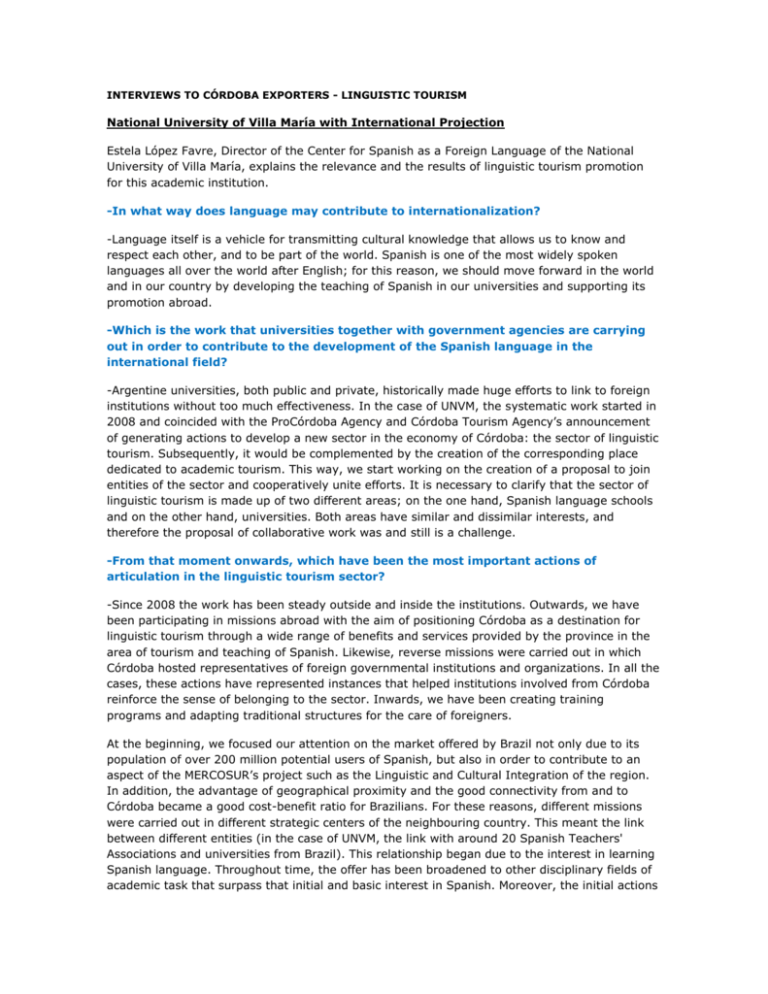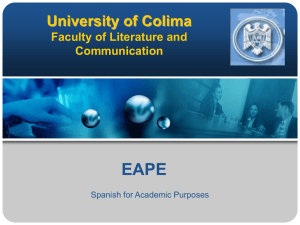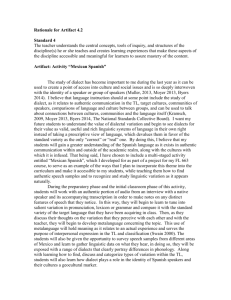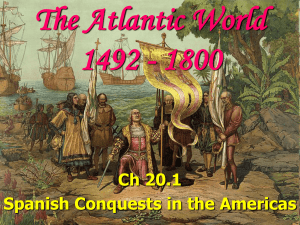clicking here
advertisement

INTERVIEWS TO CÓRDOBA EXPORTERS - LINGUISTIC TOURISM National University of Villa María with International Projection Estela López Favre, Director of the Center for Spanish as a Foreign Language of the National University of Villa María, explains the relevance and the results of linguistic tourism promotion for this academic institution. -In what way does language may contribute to internationalization? -Language itself is a vehicle for transmitting cultural knowledge that allows us to know and respect each other, and to be part of the world. Spanish is one of the most widely spoken languages all over the world after English; for this reason, we should move forward in the world and in our country by developing the teaching of Spanish in our universities and supporting its promotion abroad. -Which is the work that universities together with government agencies are carrying out in order to contribute to the development of the Spanish language in the international field? -Argentine universities, both public and private, historically made huge efforts to link to foreign institutions without too much effectiveness. In the case of UNVM, the systematic work started in 2008 and coincided with the ProCórdoba Agency and Córdoba Tourism Agency’s announcement of generating actions to develop a new sector in the economy of Córdoba: the sector of linguistic tourism. Subsequently, it would be complemented by the creation of the corresponding place dedicated to academic tourism. This way, we start working on the creation of a proposal to join entities of the sector and cooperatively unite efforts. It is necessary to clarify that the sector of linguistic tourism is made up of two different areas; on the one hand, Spanish language schools and on the other hand, universities. Both areas have similar and dissimilar interests, and therefore the proposal of collaborative work was and still is a challenge. -From that moment onwards, which have been the most important actions of articulation in the linguistic tourism sector? -Since 2008 the work has been steady outside and inside the institutions. Outwards, we have been participating in missions abroad with the aim of positioning Córdoba as a destination for linguistic tourism through a wide range of benefits and services provided by the province in the area of tourism and teaching of Spanish. Likewise, reverse missions were carried out in which Córdoba hosted representatives of foreign governmental institutions and organizations. In all the cases, these actions have represented instances that helped institutions involved from Córdoba reinforce the sense of belonging to the sector. Inwards, we have been creating training programs and adapting traditional structures for the care of foreigners. At the beginning, we focused our attention on the market offered by Brazil not only due to its population of over 200 million potential users of Spanish, but also in order to contribute to an aspect of the MERCOSUR’s project such as the Linguistic and Cultural Integration of the region. In addition, the advantage of geographical proximity and the good connectivity from and to Córdoba became a good cost-benefit ratio for Brazilians. For these reasons, different missions were carried out in different strategic centers of the neighbouring country. This meant the link between different entities (in the case of UNVM, the link with around 20 Spanish Teachers' Associations and universities from Brazil). This relationship began due to the interest in learning Spanish language. Throughout time, the offer has been broadened to other disciplinary fields of academic task that surpass that initial and basic interest in Spanish. Moreover, the initial actions supported by agencies were reproducing and creating new challenges within the institutions of the sector. In this direction and as an example, in 2014, the UNVM received a valuable group of representatives of different areas of Instituto Federal de Espíritu Santo (a great federal institution) interested in moving forward in the internationalization of its environment and in the link with this Argentine university. Agreements were signed and nowadays, we are working on mobility and on joint research programs. It is important to say that the initial institutional meeting was conducted from the creation of a direct mission on the part of ProCórdoba to the State of Espíritu Santo. It was also reinforced with a reverse mission of the same actors. -Which are the real achievements of these actions of articulation? -In general and in a steady way, strong links with Brazilian institutions have been established. At the moment, the offer of teacher updating in Spanish is oriented to universities, professional associations and governmental organizations. At the same time and from the area of international relations, we are working in pursuit of student, teacher and staff mobility with Brazil and most of Latin American countries. It is important to say that its presence in International Education Fairs has provided UNVM with benefits. This presence has been supported by the agencies previously mentioned and the Secretariat of University Policies that has established the internationalization of the Argentine University as a foremost policy. At the moment, the link with different Asian and European higher education institutions is being worked on. Thanks to the actions previously mentioned, the UNVM is able to see a promising international projection. You spoke of the relevance of Brazil for linguistic tourism. Which other destinations are strategic for the progress of the positioning of Spanish? -Actions were also carried out considering other destinations. Joint missions have been carried out to Unites States, Europe and Asia. A very important result has been obtained in Singapore, that is to say, the setting up of an administrative headquarters of the Certificate of Spanish Language and Use (CELU). This achievement means that in that country students of Spanish can certify knowledge of Spanish as a foreign language with an international examination designed by a Consortium of 39 Higher Education Institutions of Argentina, among which is the National University of Villa María (UNVM). This was fulfilled on the basis of the link that emerged from an initiative of ProCórdoba in 2011with the aim of supporting the linguistic tourism sector. In Singapore’s reverse multisectoral mission we invited a representative of an institution linked to the teaching of Spanish, the representative of the Regional Language Centre (RELC -http://www.relc.org.sg/). The setting up of this headquarters is very significant for the development of ELSE Consortium because Singapore represents the gateway to Southeast Asia. As it has been mentioned before, it emerged from a strategic vision of ProCórdoba which led it to contact that centre. -Why is the setting up of CELU in Singapore for the local universities and the destination country? - For Singapore and mainly for RELC it meant the demonstration of interest on the part of an Asian institution in the language and the link with Latin America. Moreover, it meant the link with a Consortium of universities. For National universities that are part of the already mentioned Consortium, which is responsible for the certification of Spanish through CELU, the setting up of new evaluation headquarters represents the creation of new jobs and the proximity to the most remote places. All this contributes to the development of intercultural competencies necessary for working at the international level. The Consortium is always willing to look for strategic enclaves which allow it to broaden its international openness. China, another strategic destination, is being evaluated for the setting up of an administrative headquarters of CELU in a process with similar characteristics carried out in Singapore. -Regarding the economic and professional support of ProCórdoba for the visit to fairs, is this relevant for the sector? The issue of participating in international fairs with ProCórdoba is very important because fairs are attended by all those interested in progressing in the processes of internationalization and by all global service suppliers linked to education and the teaching of foreign languages. Thus, the participation in fairs becomes an instance of updating the educational and academic offer that is provided by the world. When you participate in a fair, the five continents are visited; you go out into the world. This is impressively effective. From UNVM we value the effort on the part of entities that make up the sector and the starting point from ProCórdoba Agency and Córdoba Tourism Agency. We are aware of the fact that it would have been impossible to reach a greater degree of international linkage without the continuous support with clear objectives set by the already mentioned agencies. -If we look to the future, which are the challenges to continue working with the internationalization of the linguistic tourism sector? Which is theUNVM’s contribution in this sense? -We will be working in several areas. In first place, we will develop the range of intensive and regular courses of Spanish and Argentine Culture and those of SpanishTeacher Training (mainly for the growing interest of Brazilian audience). In second place and as members of ELSE Consortium, we will contribute to the dissemination of Spanish language and its accreditation in universities around the world. Finally, as a participating organization of the Space of International Relations of UNVM, CELE will contribute to expanding the international scope of it. Another important challenge is working in favour of the conception that Spanish, as spoken language in most of Latin American countries, gives prestige to Latin American institutions that are involved in teaching, assessing and accrediting it. These are activities that were always present in the field of the Spanish institutions.







